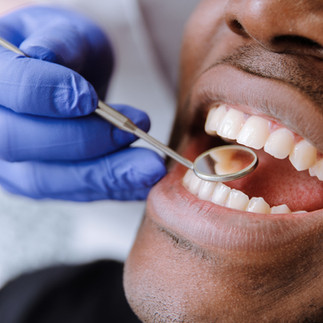All About Oral Health with Dr. Samuel Zwetchkenbaum and Jasmine Franco
- Emily Bernstein

- Apr 16, 2025
- 4 min read
Written By: Mia Cooper
A great way to celebrate National Public Health Week is to learn from public health leaders in our communities. This week I sat down with Dr. Samuel Zwetchkenbaum, Dental Director at the Rhode Island Department of Health (RIDOH), and Jasmine Franco, RIDOH’s Oral Health Program Manager to talk a little bit about dental care in the greater Providence area. A lot of times, dental care is not at the forefront of our minds when we think of healthcare, and it can often be missed. I was so grateful to learn more about what programs are being implemented in Rhode Island to involve more people in the dental field and share accurate and crucial oral health information.
I wanted to ask both Ms. Franco and Dr. Zwetchkenbaum a bit about the barriers that exist in dental care. They explained how dental offices tend to be placed in neighborhoods with higher income levels. This makes it difficult for individuals who do not live in these communities to get to the office for appointments. On top of the limited locations, dentists are fully booked, work a typical 8-5 schedule, and are usually not open on the weekends. This makes it difficult for individuals who work hourly during the week, need childcare to go to appointments, and need to take sometimes unreliable public transportation. Another issue, Dr. Zwetchkenbaum explained that most dental offices do not take Medicaid, which inherently cuts out a large part of the population. All of these variables together, or even just one, can deter people from receiving the healthcare that they need-especially if dental care is not looked at as a necessity. He also shared that Federally Qualified Health Centers (FQHCs) are an extremely important partner in providing dental care to community members, but in recent years staffing challenges have led to reduced appointment availability.. We spoke about the importance of encouraging local dental offices to work with community health workers (CHWs) to better the experience for not only the dentists but community members as well.

Although there are several barriers to accessing dental care, RIDOH and the State’s Oral Health Coalition are working on dental workforce strategies. Ms. Franco shared that the RIDOH received a grant to support the development of a Dental Workforce Strategic Plan which includes four priority areas: recruitment, retention, workforce education and training, and policy development. Identifying these four “buckets” allows them to better create an action plan to establish what could be done better.
Since Rhode Island does not have a dental school, it is important to establish a positive dental community within the State to bring dentists here and keep them working in Rhode Island. Some ideas involve diversifying the workforce and increasing dental opportunities by bringing in 4th-year dental students to do student externships at health centers under the supervision of dentists. The goal behind this program is to encourage individuals to come back and work in Rhode Island after they finish their degree. I also learned that implementing Dental Assistant Programs in high schools is a great way to encourage young people to go into dentistry and promote oral health. A final really important method in increasing oral health awareness is getting primary care physicians to work with dentists. A primary care doctor can encourage their patients to go see a dentist as a preventive measure--not just when they need one. Only about 20% of an individual’s oral health is attributable to what takes place at dentist visits. The rest is attributable to prevention and education.
Important healthcare information is also a foundation for good oral health. This includes people understanding what is both beneficial and harmful for oral health. For example, it is well known that frequent exposure to sugars and fermentable carbohydrates is harmful to oral health, especially if it is consumed without taking proper care of one's teeth
Dr. Zwetchkenbaum explained that in the United States, use of fluoride has shown a 25% decrease in cavities and tooth decay. Adding fluoride to drinking water is a critical and proven preventive strategy that boasts a 75+-year history of reducing decay rates. Recent studies suggest that at very high levels and with long-term exposure, fluoride could have negative neurodevelopmental and cognitive impacts; however, this is not a concern in the US because the levels of fluoride in US water supplies is very low. Fluoride also increases teeth’s resistance to demineralization when they are attacked by high-acid foods. Dental health professionals are working on sharing evidence-based information on the benefits of fluoride and the close monitoring that public water systems go through to ensure that fluoride levels are safe. Dr. Zwetchkenbaum shared “We work closely with RIDOH’s Center for Drinking Water Quality and every month, we receive fluoride numbers from water systems throughout the State to confirm it's at the .7 parts per million.”
We ended our conversation by discussing what ways community members can get involved in oral health promotion. A large point of conversation was that we need to encourage people to enter the dental field. Programs such as the dental hygiene program in high schools are a great way of encouraging jobs within the dental field. School-based dental services are becoming more and more prominent within Rhode Island school systems, but it is important, as a member of the community, to continue to encourage those around you to take care of their oral health and share accurate information. To learn more about the RIDOH dental efforts go to www.health.ri.gov/oralhealth.






Comments